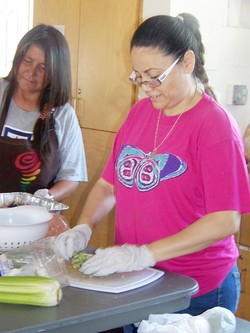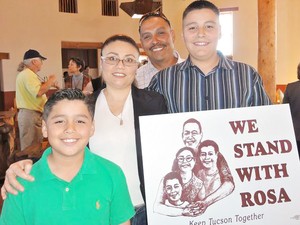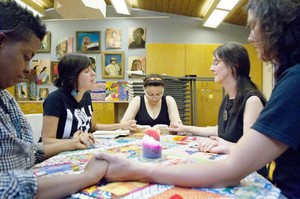Rosa Robles Loreto hasn’t been to Mass at her parish for almost 15 months. Facing imminent deportation, the undocumented Catholic mother sought sanctuary at Southside Presbyterian Church in Tucson, Ariz., in August 2014. She, her family, her attorney and supporters have appealed to Immigration and Customs Enforcement (ICE) to close her deportation case, which stemmed from a traffic stop. But more than a year later, the reprieve has not come.
Robles Loreto, who arrived in Tucson from Mexico in 1999, lives in a small furnished room at the church. It’s a calm eye in the hurricane of controversy that swirls around her and the estimated 11 million people who live in the United States without legal status. Southside, a sanctuary church for Central Americans in the 1980s, revived that tradition in spring 2014, when Daniel Neyoy Ruiz and his family took shelter from deportation. In just over a month, ICE issued him a stay of deportation.
Robles Loreto is a devout Catholic, a member and volunteer at St. Monica Parish. Her husband, Gerardo Grijalva, frequently visits with their sons, but he also takes them to St. Monica, where José Emiliano, 9, studies catechism and Gerardo Jr., 12, has made his first Holy Communion. Their priest and catechism teacher have visited Robles Loreto, she said. A few priests have come to celebrate Mass with her and Bishop Gerald Kicanas of the Diocese of Tucson has visited her several times.
While she waits, Robles Loreto also draws spiritual strength from the church that took her in. Every Sunday, she worships in the kiva—the sunken Hopi-style sanctuary at Southside—usually with her family. Occasionally, she reads a Bible verse in Spanish from the pulpit, a tradition in this multicultural church.
“I like the way we pray personally for the members,” Robles Loreto said about the Southside custom of passing the microphone around for individual prayer requests. She also likes the time for children and the Sunday school her boys enjoy.
Robles Loreto is grateful for “the love they [Southside members] offer, the help I see here, giving food to those in need, to refugees crossing the desert [Samaritans group], to people who don’t have a home or roof over their head,” she said. “All this I have learned from this church.”

Rosa Robles Loreto (right), with Ana Bitsoie, chops vegetables for Cross Streets Community, a program of free meals and showers at Southside Presbyterian Church. —Denise Holley
On Wednesdays, Robles Loreto joins a crew to prepare food for a twice-weekly meal for homeless persons and others in need. She used to see some of those people on the street, but now, “they have a face,” she said.
Providing sanctuary has “deepened our sense of what hospitality is all about,” said the Rev. Alison Harrington, pastor at Southside. “When you welcome someone into the life of your church, it means there’s some shifting of what your life together looks like.”
This shifting has altered the life of longtime Southside member Cecilia Valenzuela Gee. When the congregation voted to grant sanctuary to Robles Loreto, she joined the hospitality team. She now helps coordinate nearly 100 volunteers who stay at the church in shifts around the clock so Robles Loreto is never alone.
“I have developed a life commitment to Rosa,” said Valenzuela Gee, a retired university teacher. “It gives me a lot of joy.”
Southside hosts a nightly prayer vigil that draws pastors, members and musicians from churches all around Tucson, Valenzuela Gee said. Participants include Catholics, Protestants, Jews and Buddhists.
The wait for a resolution to her deportation case is “excruciating for her [Robles Loreto],” Valenzuela Gee said. “The vigils are a tremendous source of support for her.”
Valenzuela Gee and other Southside members have visited numerous Catholic and Protestant churches in Tucson to speak on behalf of Robles Loreto, she said. They deliver hundreds of signs that proclaim, “We stand with Rosa” for parishioners to post in their yards.
“I think this [sanctuary] movement is grounded in faith and guided by the words of Jesus to keep families united,” said Valenzuela Gee, who was raised Catholic. “This is the right thing to do.”

Rosa Robles Loreto (second from left) stands with her family in the kiva (sanctuary) at Southside Presbyterian Church. From left are José Emiliano, 9, Rosa, Gerardo Grijalva Sr. and Gerardo Jr., 12. —Cecilia Valenzuela Gee
Other churches have joined members of Southside to knock on doors and distribute several thousand Rosa signs, Harrington said. They have written letters on her behalf to ICE and the Department of Homeland Security.
“We are feeling very hopeful that her case will be resolved … based on a lot of hard work in the past year,” Harrington said.
Alejandra Mota, a leader of the New Sanctuary Movement in Philadelphia, lifted up Robles Loreto in prayer when she spoke during Pope Francis’ visit to the U.S. in September.
Robles Loreto greatly admires Pope Francis, she said. “With all the problems in this country, he calls on people and Catholic churches to open doors for our brothers.”
Robles Loreto has sent two letters to the Pope through a nun, a priest and the Philadelphia group, Valenzuela Gee said. They both hope the Francis will speak out for her and the many others facing deportation.
“In this moment, my biggest hope is Pope Francis,” Valenzuela Gee said.
-----
More information on PC(USA) involvement in the sanctuary movement can be found at pcusa.org/sanctuary.

